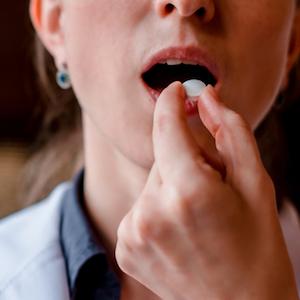Depression is something of a black box. Its underlying causes aren't completely understood, nor why particular medications work for some people but not others. Even worse, treatments are not fully successful in up to 60% of patients. Learning more about the molecular details of mental illness will go a long way toward designing better drugs.
With these ends in mind, a team of Portuguese researchers examined the effects of two antipsychotic medications (which can also be used to treat major depression) on the behavior and physiology of rats. Their results are published in Translational Psychiatry.
Rats can be made to exhibit depressive-like symptoms through chronic mild stress. In this study, the rats were subjected to various types of unpleasantness, such as short-term food or water deprivation, followed by exposure to inaccessible food or empty water bottles. They also endured inverted day/night cycles and flashing strobe lights. During the final three weeks of this torment, the rats were divided into four groups and given saline (control), fluoxetine (a.k.a. Prozac, an antidepressant), haloperidol (classical antipsychotic), or clozapine (atypical antipsychotic). A fifth group of luckier control rats did not undergo any stress and were simply given saline.
 To determine how the rats were feeling, they underwent a series of tests. For instance, one assessed pleasure (by measuring how much sugar water the rats drank), and a second judged despair (by monitoring how long rats floated helplessly in a forced swimming test). Depressed rats drank less sugar water and seemed indifferent to the prospect of drowning.
To determine how the rats were feeling, they underwent a series of tests. For instance, one assessed pleasure (by measuring how much sugar water the rats drank), and a second judged despair (by monitoring how long rats floated helplessly in a forced swimming test). Depressed rats drank less sugar water and seemed indifferent to the prospect of drowning.
Rats that received some sort of pharmaceutical intervention had different outcomes. Prozac and both antipsychotics improved the rats' desire for sugar. But the forced swimming test, the results of which are shown on the right, had a strikingly different outcome.
Control rats (which did not undergo any stress) spent little time being immobile. In other words, they kept trying to swim because they weren't in a state of despair. Stressed rats that were given saline spent almost twice as long being immobile, an indication that despair had set in and they had accepted a watery demise. Rats given the antipsychotic haloperidol performed the worst (their despair was exacerbated, possibly due to the drug's sedating effect), while rats provided clozapine exhibited similar behavior as the control rats, an indication that the medication was working. (Data from another chart showed that Prozac had a beneficial impact, too, but not as large as that of clozapine.)
When the researchers examined the rats' brains, they found that stress had a detrimental impact on the growth of new brain cells (i.e., neurogenesis) as well as their survival. Stressed brains also had shorter neurons with fewer connections to other neurons. Clozapine reversed all of these harmful effects.
Increasingly, research is showing that mental illness is a visible manifestation of molecular interactions gone awry. Identifying the physiological processes that have gone wrong and how specific interventions can reverse them will be a great help to patients who do not respond well to current medications. Hopefully, such insights will translate quickly into remedies for those who suffer from depression, schizophrenia, bipolar disorder, and other forms of mental illness.
Source: M Morais, et al. "The modulation of adult neuroplasticity is involved in the mood-improving actions of atypical antipsychotics in an animal model of depression." Translational Psychiatry 7, e1146. Published: 6-June-2017. doi:10.1038/tp.2017.120




